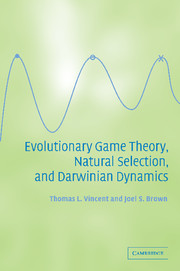Book contents
- Frontmatter
- Contents
- List of figures
- Preface
- 1 Understanding natural selection
- 2 Underlying mathematics and philosophy
- 3 The Darwinian game
- 4 G-functions for the Darwinian game
- 5 Darwinian dynamics
- 6 Evolutionarily stable strategies
- 7 The ESS maximum principle
- 8 Speciation and extinction
- 9 Matrix games
- 10 Evolutionary ecology
- 11 Managing evolving systems
- References
- Index
10 - Evolutionary ecology
Published online by Cambridge University Press: 11 August 2009
- Frontmatter
- Contents
- List of figures
- Preface
- 1 Understanding natural selection
- 2 Underlying mathematics and philosophy
- 3 The Darwinian game
- 4 G-functions for the Darwinian game
- 5 Darwinian dynamics
- 6 Evolutionarily stable strategies
- 7 The ESS maximum principle
- 8 Speciation and extinction
- 9 Matrix games
- 10 Evolutionary ecology
- 11 Managing evolving systems
- References
- Index
Summary
The ecological theater and evolutionary play were Hutchinson's words for evoking the interplay between ecological and evolutionary dynamics. Yet evolutionary ecology, that harmonious blend between what is evolutionarily feasible and ecologically acceptable, has often been difficult to achieve conceptually. The genes of traditional genetic models of evolution are not easily integrated with the individuals of population dynamic models. The G-function provides a conceptual bridge between population dynamics and evolutionary changes in strategy frequency. The structure of the G-function and the underlying population dynamics provide the ecological theater while the strategy dynamics, species archetypes, and macroevolutionary production of novel G-functions provide the evolutionary theater. Evolutionary game theory is broadly applicable to modeling questions in evolutionary ecology. Here we explore a subset of topics. The topics are chosen because of familiarity, broad interest in ecology and evolution, and for illustrating the formulation and application of the G-function approach.
Habitat selection
Behaviors allow animals to adapt to temporal and spatial variabilities in hazards and opportunities. Feeding behaviors are grouped roughly into decisions of what to eat (diet choice), how thoroughly to exploit a depleting feeding opportunity (patch use), and where to seek resources (habitat selection). There is a hierarchy of temporal and spatial scales in going from choosing a food item in the food patch up to habitat selection where an organism seeks a place to live and forage. Habitats may vary in the quality of climate, physical structure, predation risk, and resource productivity.
- Type
- Chapter
- Information
- Publisher: Cambridge University PressPrint publication year: 2005



